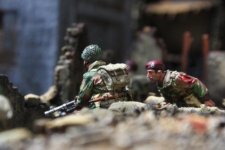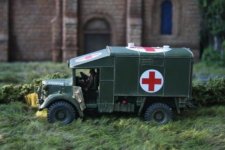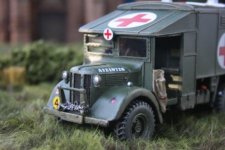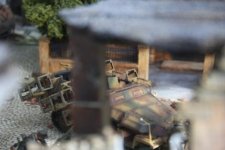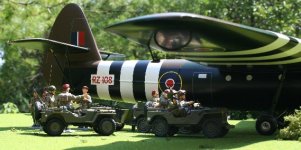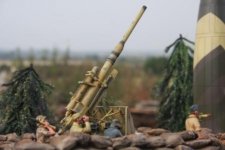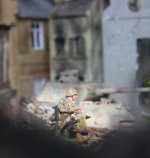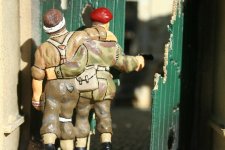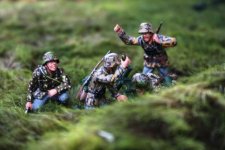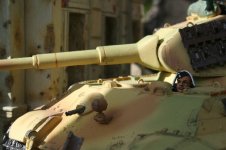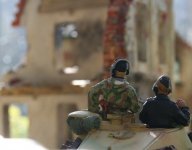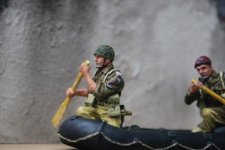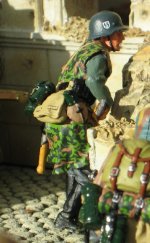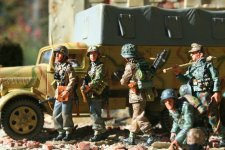part 2
Monday morning saw quicker progress, although pestered by snipers, positioned in houses and buildings on the way. Sly snipers shooting in surprise — shooting and running. At the Bridge things were hotting up. Casualties were very high. Dead strewed the buildings at its approach. Wounded fell out, received attention- and fell in again, to be re-wounded in turn, or killed. The Second Battalion held on, bloody but unbowed waiting the Second Army — and waiting for us, the First Battalion.
The second air-lift, reinforcements were due in at ten on this Monday morning. Sweet relief. It was nearer 5pm, when they dropped. Too late — was it too late? We were halted at a cross roads in Oosterbeek. It looked as if we would be there forever. Suddenly my buddy, Corporal Stan Lunt and I, on stolen time, decided to investigate a rumour of a German SP Gun at the station nearby. We slipped up a side street to the station. The street led over a small bridge beneath which, in a cutting lay the station. We were surprised to see a man in the station office.
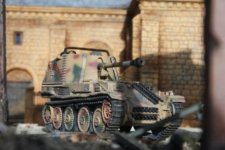
Lunt with Sten gun ready strode across the bridge. I stood on the side to cover him. Beyond the bridge the road was flanked by a high hedgerow. Suddenly, above the hedge, a hand appeared and a German stick grenade tumbled down towards Lunt. I shouted, he stepped back, firing a burst at the hedge. An unearthly agonised scream mingled with the explosion of the grenade. Lunt scrambled back towards me unhurt, as I fired ten rounds rapid into the hedge.
We scurried around the corner of a large house as the Germans counter-fired. From the house stepped a Dutchman, ‘would you like a cup of tea?’ — in English. Blimey what a time for a cup of tea. ‘No thank you, goodbye’. We scrambled over a wall and eventually rejoined our unit. Our beloved Sergeant McKnight greeted us — ‘Where the hell have you been?’ We were moving again, into Arnhem. Smoke and fire darkened the streets. Broken glass and broken vehicles, debris littered the roads. At one point we passed a German staff car, stopped with the occupants dead, one hanging from the driving seat, the other strewn below him on the road. Further on a water main had burst, spraying a minor torrent into the roadway. The body of a dead civilian, in blue overalls, lay in the gutter, with the cooling insolent water mingling with his blood, lapping gently round his body.
German planes swooped overhead, making for the beleaguered Second Battalion. No British planes.
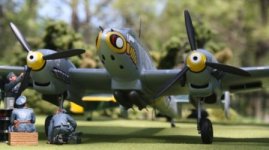
Soon we were withdrawing. We couldn’t make the bridge. Sorry we can’t make it — our apologies were written in blood. We went back, from house to house. Scrambling across street corners. Further back. Night fell, still moving. A machine gun burst, wounded four of the platoon, from the treacherous darkness. Dawn on Tuesday, saw us withdrawing again. The German iron ring was closing in on us, relentlessly. Mortars thumped and clattered around us. Murderous thumps. German tanks whirled and snarled close by. A call came for our Bren-gunners. I had one now. Lunt and I ran forward. At a corner, a German Tiger tank was firing over the cross-roads. Our anti-tank guns had smashed one of his tracks, but he was still firing. I threw myself on the road, the massive front of the ‘Tiger’ rattled with the impact of my long burst. His gun ceased firing.
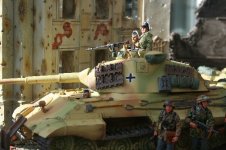
A shout. Germans behind a hedgerow — I ran to a fence adjoining a corner shop, my Bren across the railings, and raked the hedge with fire. A momentary pause and then the sheet glass of the shop by my side crashed in a myriad of tinkling pieces. The tank had woken up. A near miss, thank God. I decided to move — we withdrew. As we left Arnhem, we knew somehow we wouldn’t be going back. That night we hardened our position. The withdrawal had congested the road from Arnhem to Oosterbeek.
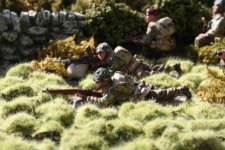
Units became inextricably mingled, easy prey for marauding tank shells and mortars. We were to help with the withdrawal into the ‘perimeter’ round Oosterbeek. The bridge defenders must be on their last legs by now.
We took over a house on an embankment overlooking the broken rail bridge across the Rhine. Our backs were against the wall, but the Germans gave us a quieter night. Above Arnhem, in the distance, the sky glowered red with the fires burning beneath. Wednesday’s first light saw me sharing a fry-up of bacon with a gunner-officer. A cooked meal, my first since early Sunday in England. Especially welcome. Welcome because I had left my pack at one of the woodland halts. I had since lived off the land, pears and tomatoes, scrounged on the way. On of the lads began to shave. To shave in his meagre supply of water — precious water. ‘What the hell are you shaving for. When we get back they will think you have been to a bloody party’. When we get back — if we get back.
From windows overlooking the Rhine and the low-lying fields between, with Bren gun I waited, waited with aggressive, war-like Jock Clements. Below us, an anti-tank gun, camouflaged. Beyond this, skirting the field, were remnants of our unit, under Lieutenant Williams, a well respected officer. Further ahead lay a scattering of dead cattle and a deserted German ‘Flak’ position. Time slipped by, the Germans were late. Suddenly from nine o’clock left, over the railway, poured a fast moving arrowhead formation of troops. Our forward unit called ‘Enemy’ and we fired our Brens. The Germans never knew we were there. They never knew what hit them. At 300 yards they were wiped out — one man flailing his arms above his head.
Quiet again — At the broken bridge beyond, a German tank sneaked through. Before it could gain advantage the anti-tank gun fired. A direct hit. An explosion, flame bursts, and scurrying figures. Another danger dealt with.
As the ‘Perimeter’ closed we withdrew again, under fire, to new positions, dug in along the edge of a dyke. Spasmodic mortar fire punctured the night. In one flare up we suffered a great loss — Sergeant McKnight — one of the boys.
Thursday — Hell is Thursday. Supply planes were still coming in, dropping their precious supplies — into German hands. Sometimes ‘Dummy’ running, some at tree-top level, in flames from ‘Flak’, courageous but futile. We weren’t there. Crashing in flames from concentrated ‘Flak’ pounding like devilish piledrivers. In a hopeful attempt, Lieutenant Clarkson lit a yellow smoke candle. A recognition signal to the planes. Almost immediately he was hit by a well directed mortar bomb. The yellow cloud drifted slowly over our lines. ‘Anybody gotta *** — When’s the Second Army coming?’ ‘Look to your front’. We repelled an advancing company of Germans, reeling and scrambling for cover. The Germans were quick to react. Bombs showered among our positions, spewed by the multi-barrelled mortars, splinters splattered through the stinking smoke. Death stalked two-handed to his harvest. Amid this hell, pinned down, deafened and weary, I dozed off. Asleep in the inferno. When I awoke (a hundred years later?) An astonished comrade exclaimed, ‘I thought you were dead’.
Four PM — we must withdraw. The remnants of our Unit fell back along the base of a dry ditch. Myself, Corporal Lunt and Private Frankie Thompson covered them with Brens. We went back, through the smoke, eyes peering. An oath — Lunt had been hit. In the thigh from the flank, we couldn’t see where. We ran back. ‘Nothing serious’. He pushed us on. A few yards and searing pain snatched my arm. A bullet scorched through my side and tore out of my back. I looked at my arm, shattered, with blood pouring down, trickling from my fingers. My back, now numb, felt saturated in blood. They came to me. Told me to rest. ‘Be back with a stretcher Wally’. Death only comes to other soldiers. All soldiers know this — I felt the pain, the weakness flowing over me. This was it — This mustn’t be it. My thoughts flooded back to my home — to my home. This mustn’t be it — I don’t want to die. A silent prayer.
I forced myself to my feet, arm useless, in pain. Dead and dying lay all around, choking in filthy smoke. I caught the eyes of a comrade in desperate agony. ‘I’m sorry mate, I can’t help, sorry’. I stumbled drunkenly across a thousand miles of fields and ditches. My eyes unseeingly. My legs rebelled but I forced myself on. ‘Whatsamatter Bol’? The voice of Ginger Pearce guided me to a large house. A house being used as a dressing station. Outside the dead lay against the walls. Inside there was hope. ‘Get out’. ‘Only wounded in here’ — because I wasn’t carried in, I wasn’t wounded. God let me in — I fell in. They dressed my wounds, injected morphine and helped me to an upstairs room. A room where wounded lay all round the walls. No beds, no stretchers left for me. They lay me, belly down, on a narrow table. A seven-day clock ticked in a corner. To sleep. The morphine helps. How it helps.
